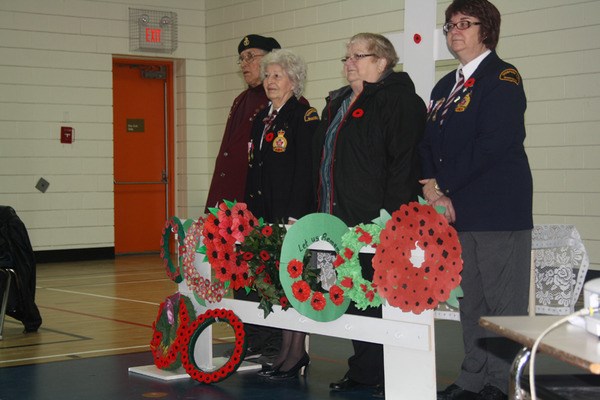Remembrance Day ceremonies were held across the city last week, including Nov. 10 at Burntwood Elementary School.
"I'm really happy and honoured to be here today, to tell you stories," aboriginal Korean War veteran Percy Laubmann told the assembly of Burntwood students, staff, and friends. Laubmann's week included speaking at many schools in the area, starting off at Wapanohk Community School on Nov. 8.
Laubmann spent 14 months in Korea. "I was there when they had the ceasefire - July 27, 1953," he said. "Out of those 14 months, I spent three months in the hospital. I got wounded in two places - my arm, and my right leg."
"I did many different things," said Laubmann. "I used to go on nightly patrols, behind enemy lines. It was quite an experience."
"I joined because I wanted to take part in volunteer service for my country," he continued. "I always wanted to go to a war to see what it was like, and to see parts of the world. I'm not sorry I did it. I've seen a lot of places I would have never saw, because it would have cost a fortune."
While in the military, Laubmann was given four rest and recuperation (R&R) periods. He was able to spend this time in Tokyo, Australia, New Zealand, and London - the last of which he called "too big for me" - and frequently referenced these trips as the highlights of his time in service.
Born on the Hudson Bay Railway between The Pas and Churchill, where his father fed workers building the rail line, Laubmann moved to Pikwitonei in 1935 at the age of seven. After working as a trapper, he joined the military. Returning from Korea, he made stops in Churchill and Thompson before settling permanently in Pikwitonei.
Laubmann received four medals for his service, all of which he proudly wore for the ceremony. "This is the United Nations medal," he said, pointing to the first medal. "It's got the writing on the back. This is the Korean medal, that's their emblem. This one is the volunteer service medal, and this is the Queen's Jubilee medal. Not too many people earned it."
The Queen Elizabeth II Golden Jubilee Medal was created in 2002 to mark the 50th anniversary of Queen Elizabeth II's ascension to the throne in 1952. It was awarded to individuals who "have made a significant contribution to Canada, to their community, or to their fellow Canadians." The front of the medal displays the Queen, while the back shows the Royal Crown, the Royal Cypher, and a single maple leaf. Nominations for the medal could be made by all levels of Canadian government, educational and cultural organizations, the Canadian Forces, the RCMP, veterans groups, sports organizations, and philanthropic and charitable bodies.
The Korean War began in June 1950, when North Korea invaded the Republic of Korea (commonly known as South Korea). Under the recommendation of the United Nations, the United States led an effort to send troops to assist South Korea. Other nations intervening on the side of the South Koreans included the United Kingdom, Canada, Australia, France, the Netherlands, Turkey, New Zealand, Belgium, Colombia, Ethiopia, Greece, Luxembourg, the Philippines, and South Africa.
"There were some Russians there too - they tried to camouflage that too, but they couldn't," said Laubmann of who was on the other side.




